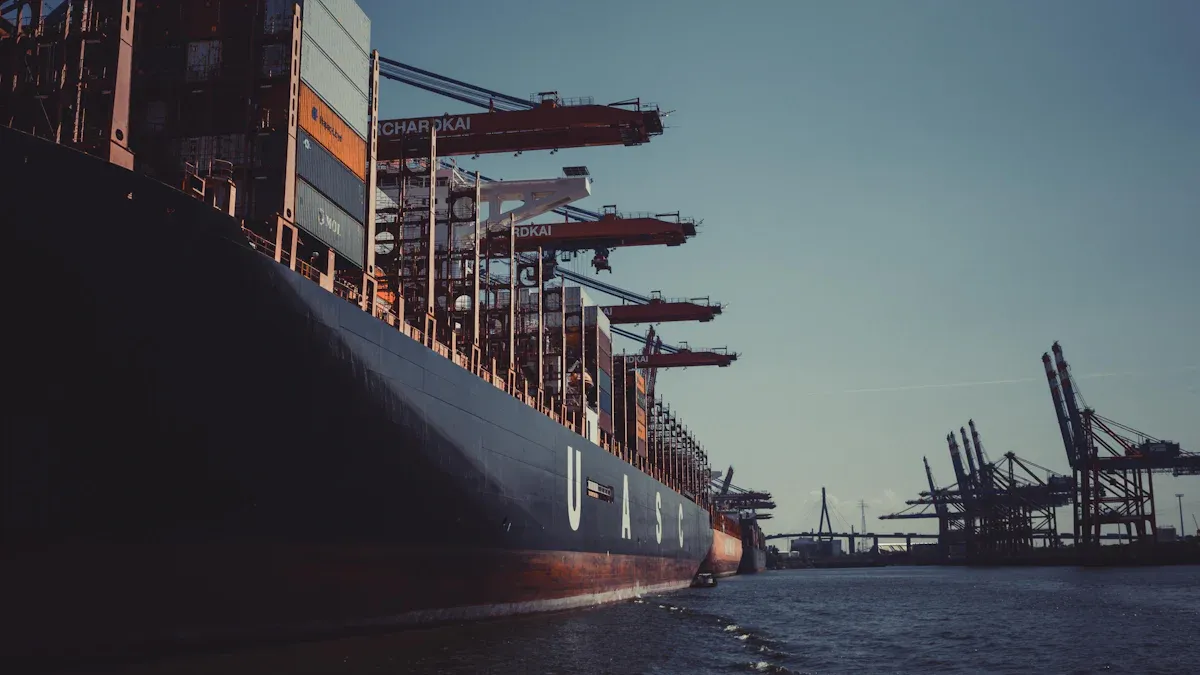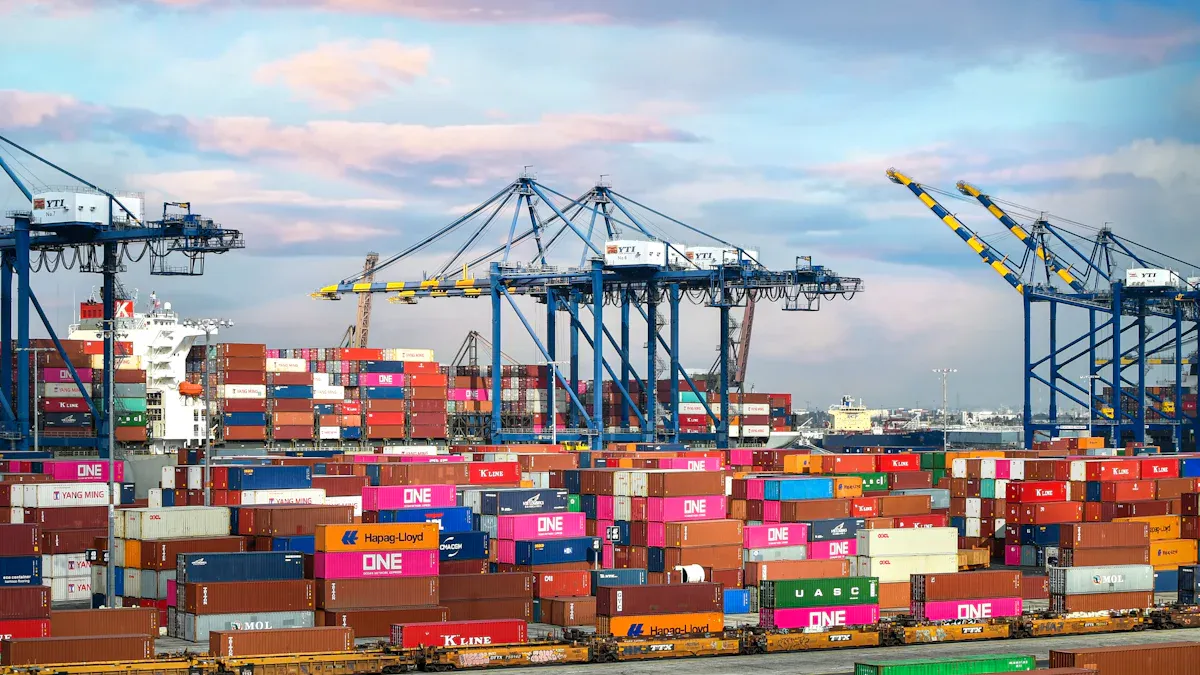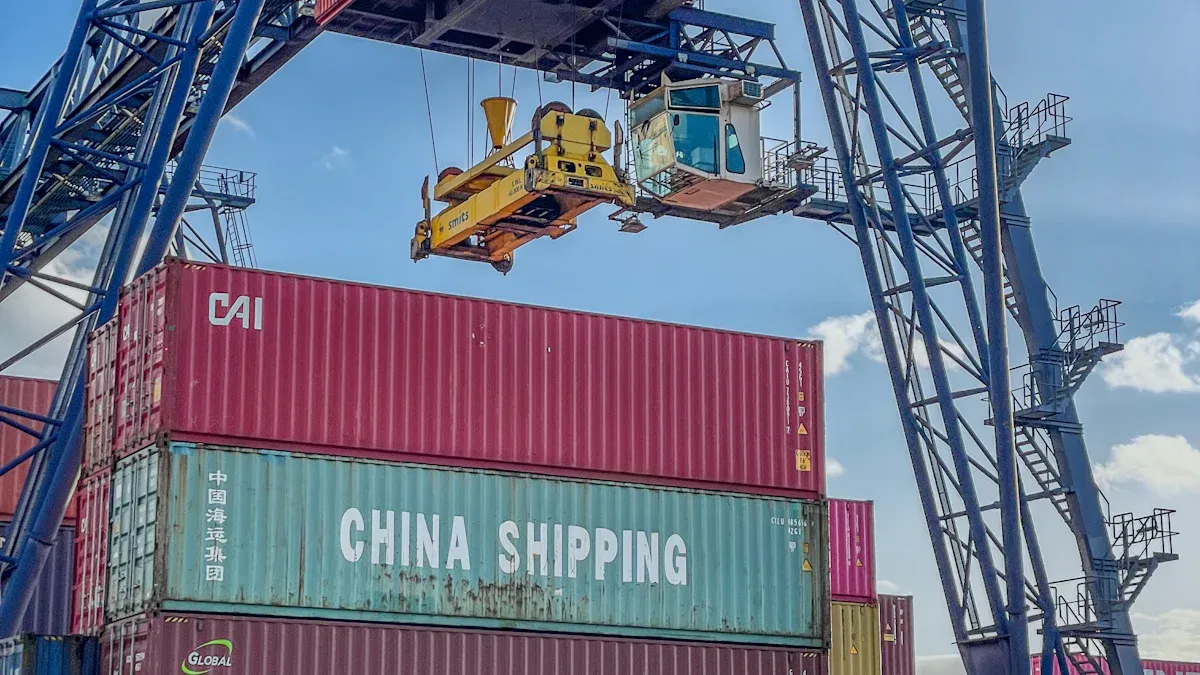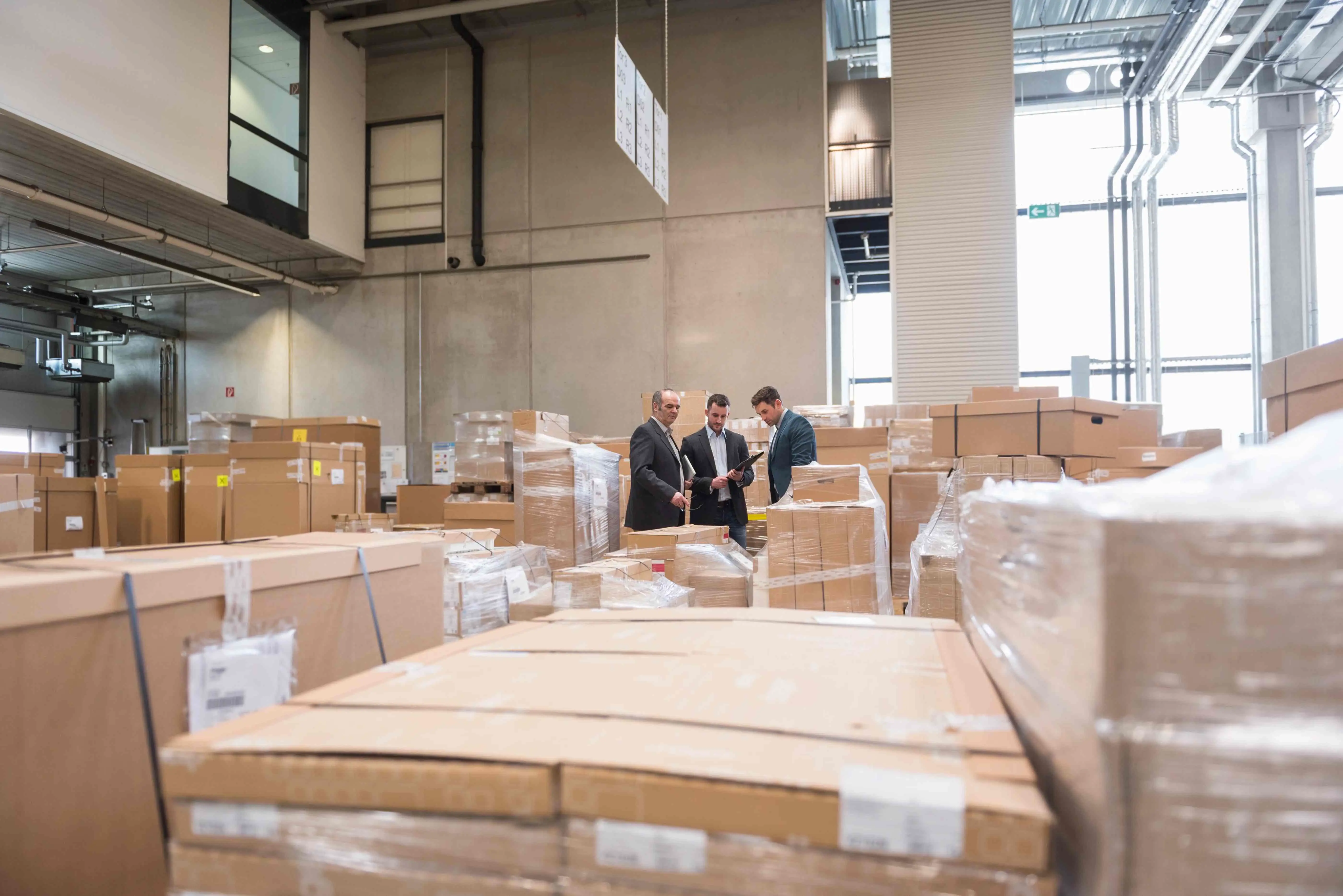Overseas logistics customs clearance

Customs clearance checks ensure that goods comply with regulations before entering or leaving a country. This process is crucial for overseas logistics customs clearance and trade. Smooth customs procedures facilitate global trade growth and enhance shipping efficiency. JusTrade simplifies this by managing customs clearance, helping businesses navigate customs regulations and improve their shipping services.
Key Takeaways
Customs clearance is important for easy global shipping. Correct papers stop delays and penalties.
Services like JusTrade make customs easier. Their system links teams and uses tech to work faster.
Knowing trade rules is very important. Understanding customs laws avoids big errors and follows the rules.
Understanding Customs Clearance in International Logistics

What is customs clearance and why it matters
Customs clearance checks if goods follow rules before crossing borders. It is important for moving goods between countries smoothly. Without it, shipments may be delayed, fined, or sent back. This process follows trade laws, protects local businesses, and helps governments earn money.
As global trade grows quickly, customs clearance has become more important. Studies show customs services are expanding fast and will grow more by 2033. With international shipping getting harder, customs clearance is key for smooth shipping and steady supply chains.
The role of customs authorities in customs clearance
Customs officers are essential for customs clearance. They check shipping papers, invoices, and other documents to meet local rules. They also calculate taxes, collect payments, and approve packages for delivery.
Customs officers protect local businesses by following trade rules and stopping fraud. Their work helps governments earn money and ensures fair trade.
Better customs systems improve efficiency. Reports show better messaging tools and longer filing times for importers. These changes cut delays and make fixing errors easier, helping businesses trade globally.
How JusTrade makes customs clearance easier
JusTrade improves customs clearance with its smart online platform. It uses AI and big data to make the process simple. It links buying, shipping, customs, storage, and finance teams for smooth communication and tracking.
JusTrade offers tools like product grouping, bonded zone services, and cross-border shipping solutions. These features reduce delays and improve business operations in industries like electronics and machinery. By using advanced tech, JusTrade speeds up customs clearance, letting you focus on growing your global business.
Key Steps in the Customs Clearance Process
Submission of essential documentation
The first step in customs clearance is submitting correct documents. You need to prepare important papers like invoices, packing lists, and bills of lading. These papers tell customs about your shipment, such as its type, value, and origin.
Good paperwork helps follow rules and avoids delays. Missing or wrong documents can cause fines or rejected shipments. Keeping your documents accurate ensures a smooth customs process.
Tip: Always check your documents carefully before sending them. This can save time and money.
Inspection and verification of goods
After submitting documents, customs may check your goods. These checks ensure your shipment follows rules and matches the details you provided. Inspections can be random or based on the goods or route.
Checks include material, size, and function tests. For example, inspectors may measure items or test if they work properly. The table below explains the inspection steps:
Purpose | Benefits | |
|---|---|---|
Material Checks | Ensure materials meet quality standards | Stops bad materials from being used |
Dimensional Checks | Confirm sizes are within limits | Prevents problems caused by wrong sizes |
Functional Tests | Check if items work as expected | Avoids issues before shipping |
Inspector’s Remarks | Gives a summary of cargo compliance | Provides accountability |
Photographic Evidence | Photos of items during inspection | Proves condition and compliance |
Meeting all rules helps avoid delays and extra costs.
Payment of duties, taxes, and fees
After inspections, you must pay duties, taxes, and fees. These are based on the type and value of your goods. Paying on time prevents delays in customs clearance.
For instance, faster payments have saved businesses money. In 2023, customs activities earned $960 million, and quicker clearances added $420 million in benefits. This shows how timely payments help the process.
Note: Use online payment methods to make transactions faster.
Release of goods for delivery
When all steps are done, customs releases your goods. You can then collect or send them to their destination. Quick customs processes help your goods arrive on time, keeping your business running smoothly.
By following these steps and using services like JusTrade, customs clearance becomes easier. JusTrade’s smart platform helps with every step, from paperwork to delivery, making international shipping simple.
Essential Documentation for Overseas Logistics Customs Clearance

Commercial invoice and its importance
The commercial invoice is a key document in global shipping. It lists details like item descriptions, amounts, and prices. Customs officers use it to calculate taxes, check rules, and confirm trade laws are followed.
A good commercial invoice avoids delays and fines. For example:
Electronics from Japan to Brazil were delayed because the invoice missed item prices. This caused storage fees and a late product launch.
A U.S. company importing textiles from India faced fines for undervaluing goods on the invoice. This led to stricter customs checks.
To prevent issues, make sure your commercial invoice is correct. Include buyer and seller details, clear item descriptions, prices, and sale terms.
Tip: Review your commercial invoice carefully before sending it. Mistakes can cause delays and extra costs.
Bill of lading or airway bill
The bill of lading (BOL) or airway bill (AWB) proves shipment and delivery. Carriers issue these documents with details like goods type, destination, and transport terms. They act as contracts between shippers and carriers, ensuring smooth shipping.
New tools like electronic airway bills (e-AWBs) improve shipping. For example:
DHL Express uses e-AWBs to speed up customs clearance. This reduces paper use and saves time.
Using such systems makes shipping faster and eco-friendly.
Note: Keep a copy of your BOL or AWB. It helps track shipments and solve disputes.
Packing list and certificate of origin
The packing list and certificate of origin are vital for customs clearance. The packing list shows shipment details like weight, size, and packaging. Customs use it to check rules and avoid fines or delays.
A good packing list helps:
Smooth shipping and rule compliance.
Customs confirm shipment accuracy.
Faster customs checks for timely delivery.
The certificate of origin proves where goods were made. It ensures correct tariffs and trade benefits. Missing it can lead to higher costs.
Tip: Always include a full packing list and valid certificate of origin. These save time and money during customs checks.
Import/export licenses and compliance requirements
Some goods need import/export licenses, like electronics or medicines. These licenses allow legal trade and ensure customs rules are met. Without them, shipments may face fines, delays, or confiscation.
For example, an electronics importer fixed delays by using a checklist and hiring a compliance team. This cut processing times by 30%. It shows how planning and rule-following help.
To meet customs rules:
Check if your goods need special licenses.
Use a checklist to organize documents.
Stay updated on trade rules to avoid problems.
Note: Services like JusTrade simplify this process. Their expertise ensures your shipment meets all rules, avoiding delays.
Overcoming Common Challenges in Customs Clearance
Fixing delays from missing or wrong paperwork
Delays often happen because of incomplete or wrong paperwork. Customs officers need correct documents to check shipments. Missing details like package counts or tariff codes can cause extra checks and fees. These delays may last days or weeks, leading to money loss and upset customers.
To prevent this, always review your documents carefully. Make sure invoices, packing lists, and bills of lading follow customs rules. Digital tools or services like JusTrade can help organize paperwork. JusTrade’s system ensures your documents are correct, cutting down on delays.
Tip: Use a checklist to keep track of needed documents and avoid mistakes.
Fixing errors in classifying goods
Wrongly classifying goods can lead to paying too much or too little in taxes. This raises costs and risks fines. To classify items correctly, know their materials, uses, and functions.
Hiring a customs broker or using JusTrade’s smart tools can help. JusTrade uses AI to sort goods properly, following customs rules. This reduces mistakes and saves time and money.
Note: Write clear product details and take photos to ensure proper classification.
Handling different customs rules with JusTrade
Customs rules change from country to country, making global trade tricky. Mistakes or breaking rules can cause fines or shipping delays. JusTrade helps by offering solutions for different regions. Its platform gives live updates on customs rules, keeping your shipments compliant.
For example, JusTrade’s bonded zone services and cross-border tools make customs easier. By using JusTrade’s knowledge, you can handle tough regulations without trouble.
Using JUSDA’s skills for smooth shipping
JUSDA has over 20 years of customs experience, making it a trusted logistics partner. It offers complete solutions to simplify customs clearance. Its tools connect shipping, buying, and customs teams for better communication.
JUSDA also provides tracking and rule checks to avoid fines and delays. By working with JUSDA, you can focus on growing your business while they manage customs challenges.
Callout: Teaming up with JUSDA ensures smooth shipping and on-time delivery of goods.
Costs Linked to Customs Clearance
Duties, taxes, and broker fees
Customs clearance has costs like duties, taxes, and broker fees. Duties are a percentage of the goods' value, including cost, shipping, and insurance. For example, if goods cost $100,000 and the duty rate is 6.5%, you pay $6,500. Taxes, like VAT or GST, depend on the country and apply to the total customs value. Broker fees are fixed charges paid to customs brokers for handling the process. These fees ensure rules are followed and paperwork is done correctly.
Tip: Knowing these costs helps you plan better and avoid surprises in global shipping.
Inspection fees and extra charges
Customs checks can add more fees. These include demurrage fees if goods are not picked up quickly, import duties based on declared value, and special charges like excise or anti-dumping fees. Taxes, such as VAT, are based on product value, shipping, insurance, and duties. Other costs may include processing fees, compliance surcharges, or broker services.
The type of goods, their origin, and tariff codes affect these costs. Some items need special permits or checks, raising expenses. Correct paperwork and following customs rules reduce these fees and keep deliveries affordable.
Tips for estimating and controlling costs
To estimate and control customs costs, list all possible expenses. Include duties, taxes, broker fees, and inspection charges. Use tools like cost calculators to predict costs based on goods' value and type. Working with experts like JusTrade makes this easier. Their knowledge of shipping routes and customs rules ensures accurate cost estimates and smooth shipping.
Note: Stay informed about global trade rules and agreements to avoid extra costs and delays.
Tips for Ensuring Smooth Customs Clearance
Partnering with experienced customs brokers like JusTrade
Experienced customs brokers make customs clearance easier. JusTrade offers smart tools to meet your needs. Their platform uses AI to follow rules and avoid delays. JusTrade provides bonded zone services and cross-border shipping solutions. These features help goods move faster in global logistics.
Tip: Pick a broker with a strong history of handling tough customs tasks to prevent delays.
Ensuring documentation accuracy and completeness
Correct and complete paperwork is key for smooth customs clearance. Missing or wrong details can slow down the process. Customs officers may need extra checks before approving shipments. To avoid this, double-check all documents like invoices and packing lists.
Missing cargo details often cause customs delays.
Correct transport papers ensure goods arrive on time.
Clear and accurate paperwork speeds up customs clearance.
Note: Use digital tools or JusTrade’s services to organize and check your documents.
Staying updated on international trade regulations
Knowing trade rules helps you follow customs laws. Compliance means following legal rules, tariffs, and risk plans. Learning about new trade laws reduces risks and improves efficiency.
Description | Benefit | |
|---|---|---|
Regulatory Advisory | Experts explain new trade laws in over 100 regions. | Lowers risks and boosts efficiency. |
Trade Risk Assessment | Finds and fixes supply chain problems. | Cuts surprise costs by up to 40%. |
Documentation Management | Automated system for accurate import/export paperwork. | Speeds up processing by 40% and avoids mistakes. |
Tip: Stay updated on trade rules and agreements to avoid fines or delays.
Utilizing JUSDA’s integrated logistics solutions
JUSDA’s tools improve global shipping efficiency. Their system connects teams for buying, shipping, customs, and storage. This ensures smooth communication. Customers have saved $500,000 and achieved nearly perfect invoice accuracy.
JUSDA’s tools reduce mistakes and improve supply chain tracking.
Their solutions speed up tariff checks and duty payments, cutting customs time by half.
Real-time updates ensure goods arrive on schedule.
Callout: JUSDA’s skills let you focus on growing your business while they handle customs challenges.

JUSDA Solutions
To provide you with professional solutions and quotations.
Customs clearance is key for smooth global shipping and trade. Good planning helps avoid delays, saves money, and keeps customers happy. JusTrade makes customs easier with smart tools and expert help. JUSDA’s logistics services improve shipping and give businesses an advantage.
Benefit Type | Description |
|---|---|
Fewer delays mean lower storage costs and better growth. | |
Impact on supply chain | Faster shipping reduces problems and improves customer happiness. |
Competitive advantage | Quick customs clearance helps companies offer better prices and faster delivery. |
Emerging trends | Using blockchain and smart systems makes customs clearer and faster. |
Tip: Use JUSDA’s knowledge to handle customs easily and grow your business globally.
See Also
Exploring Innovations in Sea Freight Logistics for 2024
Achieving Success in International Trade Through JUSDA
Understanding Advanced Manufacturing With JUSDA's Logistics Innovations
JUSDA's Technology in Logistics: Unlocking Greater Operational Efficiency
Revealing JUSDA's Latest Warehousing Solutions for Improved Efficiency
